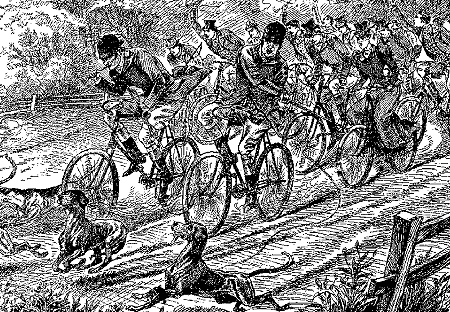Sarah Lyall, “Tally Ho! A Determined Crew Hunts for Fox Hunters”, The New York Times, February 18, 2007:
For their part, the hunters argue that they have changed their ways and now make every effort to legally ride around after artificially laid scents, a practice that a pro-hunting member of Parliament once said was about as exciting as “kissing one’s sister.”
Any chasing of foxes that may or may not occur, the hunters say, is entirely accidental.

Lucy C. Lillie, “Autumn in England,” October 1886:
My companion was eagerly inquisitive about hunting in America ; he did not cherish the idea prevalent some twenty years since that the buffalo was to be found on Broadway, nor did he feel that in a chase in America the red man could be hunted; still, his ideas of prairie shooting were about as misty as mine of hunting in England; he had an idea, he said, of taking a little run across Colorado, and thought perhaps three weeks would do it nicely. Perhaps I ought to record of him that he went on his little run, taking six months for the journey, and investing in good Western property.
George William Curtis, Editor’s Easy Chair, August 1890:
If a fox or any other animal destroys your poultry, you will justly destroy him if you can. Or if you catch a thief prowling about your house, you will deal with him in the most summary manner. But if you carefully import a thief, and turn him loose in your silver closet for the purpose of shooting him, you ought immediately to be made to choose between the lunatic asylum and the gallows…
The romance of the hunt is undeniable. It is breezy and fresh and exciting, and its horn winds far and sweet in story and song, until it becomes the horn of elfland faintly blowing. Foxes may be a pest that should be exterminated, like bears in a frontier country. But when a country is so advanced in settlement and civilization that prosperous gentlemen dress themselves gayly in scarlet coats and buckskin breeches, and ride
blooded horses, and follow costly packs of hounds across country hunting a frightened fox, the fox is no longer a pest, and the riders are not frontiersmen and honest settlers; they are butchers, not for a lawful purpose, but for pleasure. The law solemnly takes life, but the judge who should take life for sport-!
“Crazy Like a Fox,” December 2003:
From the North West Hunt Saboteurs Association’s “Tactics Booklet,” issued in Manchester, England, to instruct animal-rights activists in effectively sabotaging fox hunts.
A lot can be done to sabotage a fox hunt before it meets. Pre-meet spraying of hedges with Anti-mate or garlic can cover scent. Spraying should be conducted at hound-head height, with particular emphasis on gates. If pre-meet spraying is used, it is strongly recommended that pre-beating take place at the same time. To carry out pre-beating, walk through the wood using whistles, horns, and hunting calls in an imitation of the hunt. Pre-beating may take time to perfect.
Search for blocked earth-tunnels, and remove the blockage. Make a note of the tunnels for future reference. Secure gates in the area; this will cause the hunt considerable inconvenience and delay. In doubtful weather conditions, ring the local papers and tell them that the hunt has been canceled; if it is a pub hunt, ring the pub and tell them also. This can lose the hunt support and create confusion.
At the hunt, if you have contacted the press, hold a banner. Otherwise, it is better to act as a follower, mingling with and chatting to supporters. Spray your hand with Anti-mate and at the hounds, rubbing it into their coats. The hounds are very friendly and love to be made a fuss of. If you are late, scout around the area; country folk gazing across fields, fresh horse droppings on the road, or a large number of cars by the side of the road usually mean the hunt is nearby.


